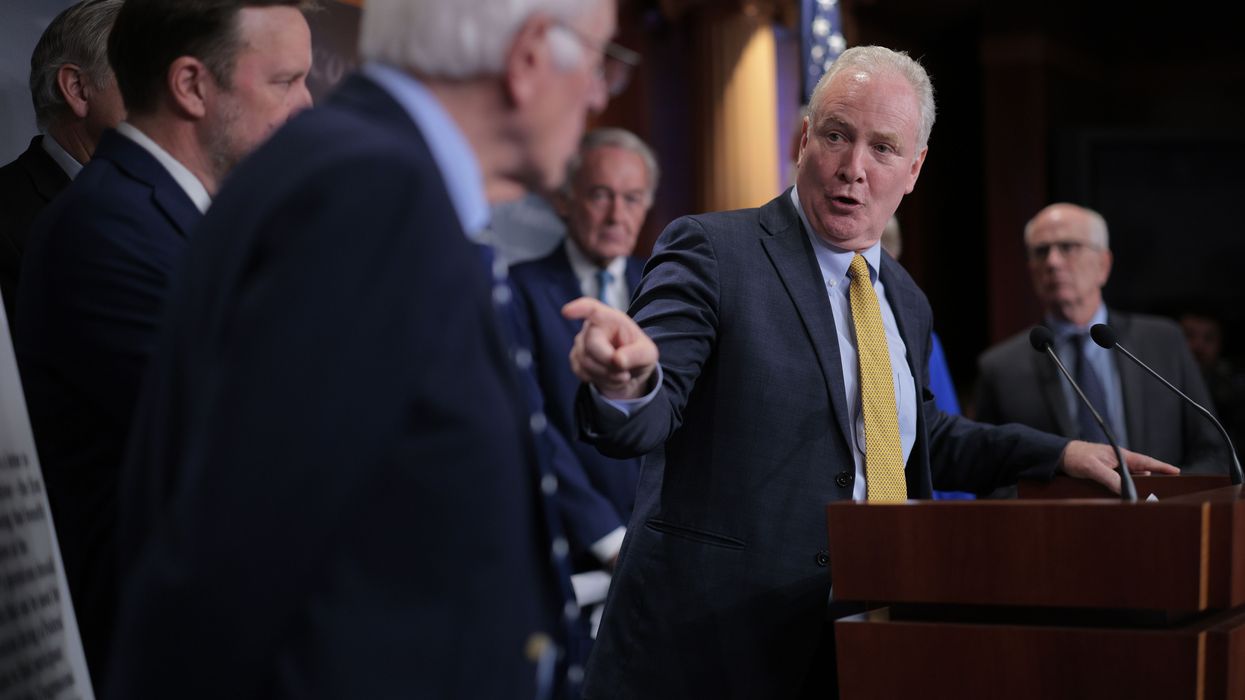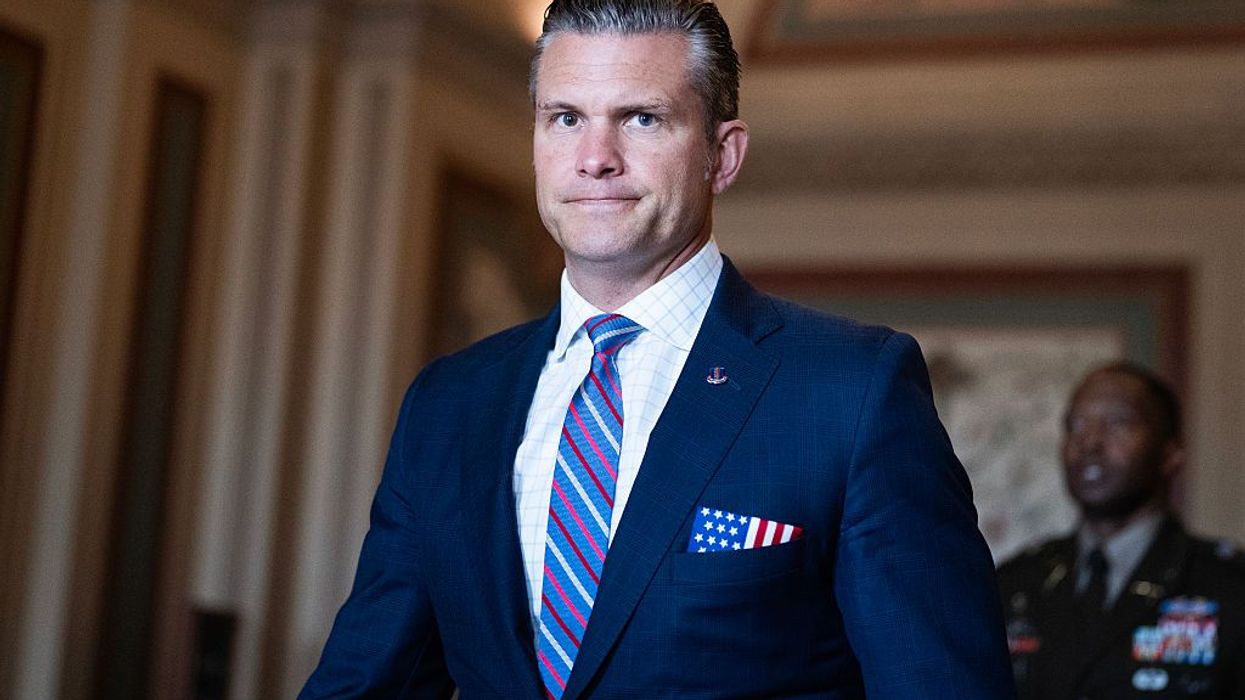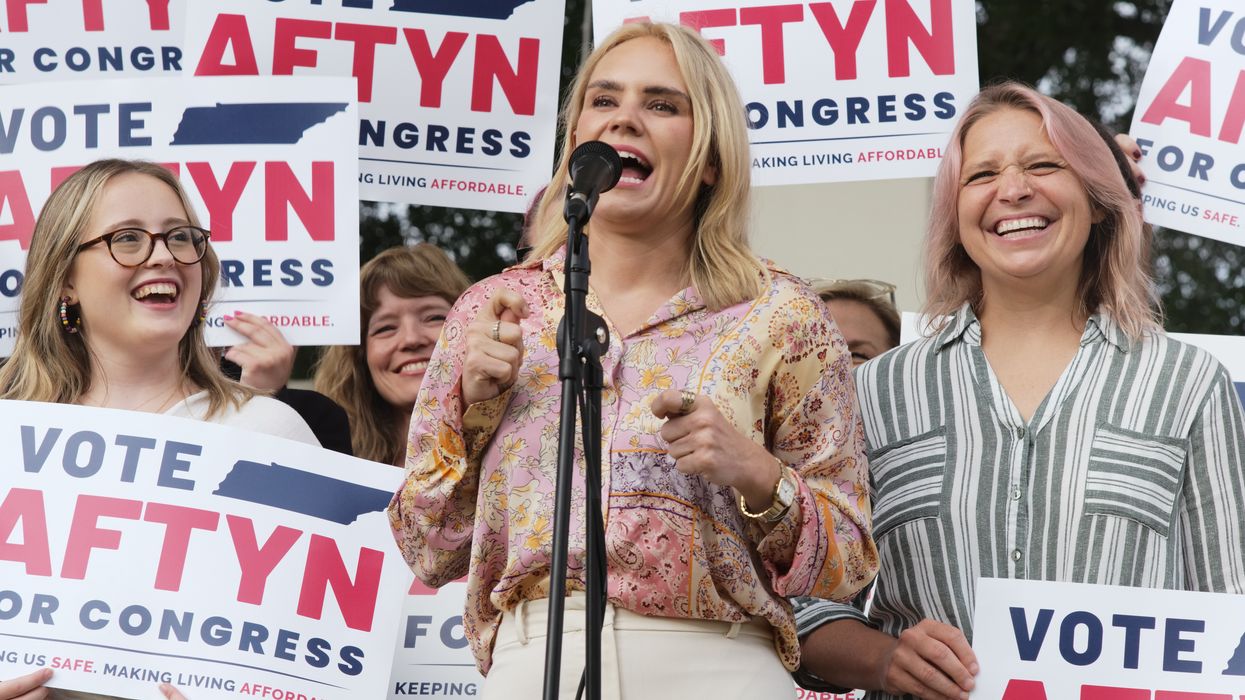March, 27 2009, 02:49pm EDT

Andrews: President's Afghanistan-Pakistan Strategy Will Lead to Quagmire
Statement by Tom Andrews, National Director of Win Without War and former US Congressman (D-ME) and Member of the House Armed Services Committee:
WASHINGTON
"I regret that President Obama, in his
desire to protect our nation from a genuine threat, has outlined a policy that
will undermine our security, not enhance it.
"The president's policy is already
uniting our enemies to fight us:
- The New York Times
reports today that the Afghan and Pakistan Taliban are burying their
differences and uniting forces to fight the United States in response to
our military escalation;[1] - According to a
recent study by the Carnegie Endowment, the
single most important factor behind the resurgence of the Taliban is the
presence of foreign forces on Afghan soil;[2] - The Coordinator of
the al Qaeda/Taliban Monitoring Team of the UN Security Council has reported
that al Qaeda aims to provoke a greater
foreign military presence in Afghanistan
and Pakistan
to unite disparate tribes in fighting a common enemy.[3]
"In short, the president's policy is
playing into the hands of al Qaeda and the Taliban by providing them with a
cause that unites and strengthens them.
"A stronger American military presence in Afghanistan and Pakistan
will make securing the support of regional stakeholders like Russia and China more difficult by placing US
forces on their sensitive borders for an indefinite period of time.[4]
"Meanwhile, our NATO allies are
increasingly divided, putting the burden of waging this war increasingly on the
shoulders of Americans. Britain is the only
country that has committed more troops to Afghanistan. Others,
including Canada and the Netherlands,
have announced plans to bring their troops home.
"The policy announced today by President
Obama is economically unsustainable. Even before the escalation of troops, the
cost of our military intervention in Afghanistan is more than $2 billion
per month and rising. His announcement that he will be seeking $1.5 billion per
year for increased foreign aid to Pakistan is a small fraction of the
cost of our military commitment.
"Finally, no exit strategy
was announced or discussed despite the president's admonition last week
on national television that "there's got to be an exit
strategy."[5]
While the president announced his intention to have performance benchmarks he
gave no indication as to what these performance benchmarks might be.
"We want to be able to support the
president and his efforts to protect the American people from the threat of al
Qaeda. But the policy announced today will fail to do so and instead takes a
significant step toward a perilous quagmire."
[1]
"Pakistan and Afghanistan
Taliban Close Ranks," by Carlotta Gall, The
New York Times, March 27, 2009. Available at https://www.nytimes.com/2009/03/27/world/asia/27taliban.html.
[2]
Carnegie Endowment for Peace, "Focus and Exit: An Alternative Strategy
for the Afghan War," by Gilles Dorronsoro, January 2009. Available at https://carnegieendowment.org/files/afghan_war-strategy.pdf
[3]
The International Centre for the Study of Radicalisation and Political
Violence, "Seven Years After 9/11: Al-Qaida's Strengths and
Vulnerabilities," by Richard Barrett, September 2008.
[4]
Leslie H. Gelb, "How to Leave Afghanistan," The New York Times, Opinion, March 12,
2009. Available at https://www.nytimes.com/2009/03/13/opinion/13Gelb.html.
[5]
President Obama, speaking with Steve Kroft, CBS 60 Minutes, March 20, 2009. https://www.cbsnews.com/sections/60minutes/main3415.shtml
Win Without War is a diverse network of activists and organizations working for a more peaceful, progressive U.S. foreign policy. We believe that by democratizing U.S. foreign policy and providing progressive alternatives, we can achieve more peaceful, just, and common sense policies that ensure that all people--regardless of race, nationality, gender, religion, or economic status--can find and take advantage of opportunity equally and feel secure.
LATEST NEWS
‘We Must Stop Tinkering Around the Edges’: Van Hollen Makes Case for Medicare for All Amid ACA Fight
"Yes, let's extend the ACA tax credits to prevent a huge spike in healthcare costs for millions," said Sen. Chris Van Hollen. "Then, let's finally create a system that puts your health over corporate profits."
Dec 02, 2025
Democratic US Sen. Chris Van Hollen on Monday became the latest lawmaker to champion Medicare for All as the best solution to the country's healthcare woes as tens of millions of Americans face soaring private insurance premiums.
In a social media post, Van Hollen (D-Md.) said that "we must stop tinkering around the edges of a broken healthcare system," pointing to massive administrative costs and poor health outcomes under the for-profit status quo.
"Yes, let's extend the [Affordable Care Act] tax credits to prevent a huge spike in healthcare costs for millions," said Van Hollen. "Then, let's finally create a system that puts your health over corporate profits. We need Medicare for All."
We must stop tinkering around the edges of a broken healthcare system.
Yes, let's extend the ACA tax credits to prevent a huge spike in healthcare costs for millions. Then, let's finally create a system that puts your health over corporate profits.
We need Medicare for All. pic.twitter.com/lszdO1vw2u
— Senator Chris Van Hollen (@ChrisVanHollen) December 1, 2025
Van Hollen's remarks came as lawmakers continued to negotiate a possible deal to extend enhanced ACA subsidies that are set to lapse at the end of the year, an outcome that would further drive up healthcare costs for millions.
Politico reported late Monday that most senators "believe the chances for a bipartisan breakthrough" before a planned vote next week "are roughly zero."
"Instead, the most likely outcome is that Senate Democrats put up a bill that has little GOP support for a vote, if any, while Republicans offer a competing bill of their own," the outlet noted. "And even those partisan proposals remained in flux as lawmakers returned to Washington from a weeklong recess."
Neither side of the negotiations is offering much more than a Band-Aid on a gaping wound. Democratic leaders want a clean extension of the subsidies to avert catastrophic cost increases, while President Donald Trump and Republican lawmakers are demanding new restrictions on the ACA that would make the system worse.
A handful of progressive lawmakers have used the worsening US healthcare crisis to make the case for a fundamental overhaul, one that would replace the for-profit model with a Medicare for All system that guarantees coverage to everyone for free at the point of service—and at a lower overall cost than the current system.
Van Hollen is the newest Senate cosponsor of the Medicare for All Act, formally backing the legislation led by Sen. Bernie Sanders (I-Vt.) just last month.
Rep. Pramila Jayapal (D-Wash.), the lead sponsor of the Medicare for All Act in the House, expressed "100%" agreement with Van Hollen's Monday post.
"Thank you, Chris Van Hollen!" Jayapal wrote.
Keep ReadingShow Less
'Furious Backlash' Inside Pentagon as Hegseth Seeks to Avoid Blame for Deadly War Crimes
"This is murder," said one legal expert.
Dec 02, 2025
Finger-pointing has reportedly begun inside the Pentagon as the Trump White House has tried to shield US Defense Secretary Pete Hegseth from taking the blame for a double-tap strike on a purported narcotics smuggling vessel that many legal experts say was an obvious war crime.
According to the Washington Post, White House Press Secretary Karoline Leavitt set off "a furious backlash within the Defense Department" on Monday after she declared that Adm. Frank Bradley, not Hegseth, made the decision to launch a second strike to kill two men who had survived an initial strike on a purported drug boat off the coast of Trinidad and Tobago on September 2.
One defense official told the Post that Leavitt's statement was "'protect Pete' bullshit," while another said that the administration appeared to be "throwing us, the service members, under the bus."
Hegseth on Monday praised Bradley in a post on X as "a true professional" who "has my 100% support." However, Hegseth also appeared to make clear that Bradley was the person in the chain of command who made the final decision to authorize a second strike on the survivors.
"I stand by him and the combat decisions he has made—on the September 2 mission and all others since," Hegseth wrote.
Even Fox News chief political analyst Brit Hume found Hegseth's praise for Bradley to be disingenuous, and he described it as "how to point the finger at someone while pretending to support him."
Bradley is set to give members of Congress a classified briefing on the strikes on Thursday amid bipartisan demands for more information.
The question of who authorized the second strike on the boat is crucial in determining who would face potential future war crimes charges. Earlier reporting from the Washington Post claimed that Hegseth gave a spoken order to "kill everybody" in the boat strikes, which was then interpreted as a justification for launching a second strike on the survivors.
Rachel VanLandingham, a military expert at Southwestern Law School, told Al-Jazeera that, regardless of who authorized the strike, it was clearly illegal.
"That second strike against individuals who are shipwrecked, clinging desperately to the side of their boat wreckage—that’s a war crime," she said. "It’s a war crime because those individuals who are shipwrecked have protected status under the law unless they were, for example, shooting a gun at somebody."
Todd Huntley, a former Staff Judge Advocate who served as a legal adviser on drone strikes carried out in Afghanistan and other nations by Joint Special Operations task forces, told The Intercept he had no doubt that the second strike on the survivors was a prosecutable offense under either federal law or the Uniform Code of Military Justice.
"This is about as clear of a case being patently illegal that subordinates would probably not be able to successfully use a following-orders defense," he explained.
Rebecca Ingber, professor at Cardozo Law School, told Time that authorizing the second strike violated "one of the most basic and longstanding rules" of the laws of armed conflict.
"It is absolutely unlawful to order that there will be no survivors,” she explained. "There is no actual armed conflict here, so this is murder."
Keep ReadingShow Less
AOC Rallies for Progressive Aftyn Behn in Surprisingly Close Race in Tennessee's Trump Country
Rep. Alexandria Ocasio-Cortez said the tight race shows that "people are increasingly recognizing that our fights are not left and right, but they are top and bottom. They are about all of us as working Americans."
Dec 02, 2025
Just over a year after President Donald Trump carried Tennessee's 7th District by more than 20 points, US Rep. Alexandria Ocasio-Cortez said Monday night that the final polls in the district's special election race between a Trump ally and a progressive state lawmaker are "a testament to how the American people are feeling in this moment."
Ocasio-Cortez (D-NY) was speaking at a virtual get-out-the-vote rally for state Rep. Aftyn Behn (D-51), who is facing GOP candidate Matt Van Epps in the district in Tuesday's special election. GOP Rep. Mark Green stepped down earlier this year for a private sector job after winning by 21 percentage points last year.
The electoral history of the district would suggest that Republicans could expect to easily win Tuesday's election, but with Van Epps ahead by just one or two percentage points in recent polling, Trump, House Speaker Mike Johnson (R-La.), and other Republicans are signaling fears that Behn could pull off an upset.
The president attacked Behn in a social media post Monday, warning that only Van Epps "cherishes Christianity and Country Music."
Like other progressive candidates in this year's elections, Behn has focused heavily on the need to make life more affordable for residents in the district, which was gerrymandered by state Republicans in 2022. The GOP eliminated a Democratic district in Nashville and its voters were added to three Republican districts, but Behn has worked to mobilize voters in predominantly Black areas that were added to the 7th District and told canvassers Monday evening that the redistricting scheme "backfired" on the Republicans.
AFTYN: “Clearly I’m living rent-free in President Trump’s mind.”
JUST NOW IN FRANKLIN — Rep. @aftynfortn Behn gave a pep talk to a group of fired up canvassers on the eve of an unexpectedly tight #TN7 special election.
(And a group hug) pic.twitter.com/1e0sNmNHEd
— The Tennessee Holler (@TheTNHoller) December 1, 2025
Behn has focused on high prices during the campaign, attacking Trump's tariff policies and decrying the One Big Beautiful Bill Act's cuts to Medicaid and nutrition assistance—calling the law the "Big Bullshit Bill."
"This is a wake-up call," she said after the law passed in July. "If we don't bring change to Congress, the billionaires and bought-out politicians will continue to rig the system against us."
As a state lawmaker, Behn proposed the Homes, Not Hedge Funds bill to stop private equity firms from buying up neighborhoods and advocated "for fair funding for rural communities" with her Rural Prosperity Act.
She's also spoken out and organized on the ground against Trump's mass deportation operation, which she's called a "flagrant abuse of power and state-sanctioned violence."
At the virtual rally on Monday night, Ocasio-Cortez said Behn's decision to take on a Trump-backed opponent in a heavily Republican district "takes a special kind of guts."
"That kind of guts is what we need more of in this country," she said. "A kind of person that says, 'We're not gonna do something because it's easy, we're gonna do it because it's the right thing to do.' And she is leading by putting herself on the line and raising her hand up first to say, 'I am going to fight for my neighbors no matter the odds.'"
🔥 WATCH — @AOC: “Tennessee is ready to elect @aftynfortn Behn. Miracles can happen… to run in an R+22 seat takes a very special kind of person with a very special kind of guts. That the race is so tight is a testament to how the 🇺🇸 people are feeling in this moment.” #TN7 pic.twitter.com/2QKr6EQUMI
— The Tennessee Holler (@TheTNHoller) December 2, 2025
Ocasio-Cortez added that the close race shows "people are increasingly recognizing that our fights are not left and right, but they are top and bottom. They are about all of us as working Americans and working-class people that are standing up against the injustices and the greed of our healthcare system, of our low wages."
Van Epps has sought to attack Behn for speaking out for the rights of immigrants, telling voters at a rally with the president, "The only way to stop crazy is to vote against crazy."
John Geer, a political scientist at Vanderbilt University, told the Washington Post that the fact that a Democratic candidate is being targeted so heavily by her Republican opponent in the 7th District and attracting the attention of the president shows the GOP is "worried."
“It’s interesting that Van Epps isn’t in a strong enough position just to ignore her,” said Geer.
Behn suggested that even if Van Epps ekes out a win in the close race, the competitive election has offered the latest proof of deep dissatisfaction with Trump's agenda.
“If we get close,” she told the Post, it will be due to the “affordability crisis that we are experiencing in Tennessee and the fact that the federal administration has not delivered an economic agenda to address the needs of working people in the state.”
Keep ReadingShow Less
Most Popular


